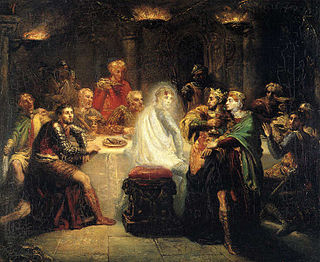
LordBanquo, the Thane of Lochaber, is a semi-historical character in William Shakespeare's 1606 play Macbeth. In the play, he is at first an ally of Macbeth and they meet the Three Witches together. After prophesying that Macbeth will become king, the witches tell Banquo that he will not be king himself, but that his descendants will be. Later, Macbeth in his lust for power sees Banquo as a threat and has him murdered by three hired assassins; Banquo's son, Fleance, escapes. Banquo's ghost returns in a later scene, causing Macbeth to react with alarm in public during a feast.
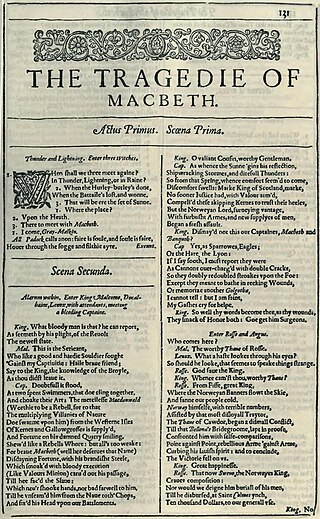
Macbeth is a tragedy by William Shakespeare. It is thought to have been first performed in 1606. It dramatises the damaging physical and psychological effects of political ambition on those who seek power. Of all the plays that Shakespeare wrote during the reign of James I, Macbeth most clearly reflects his relationship with King James, patron of Shakespeare's acting company. It was first published in the Folio of 1623, possibly from a prompt book, and is Shakespeare's shortest tragedy.
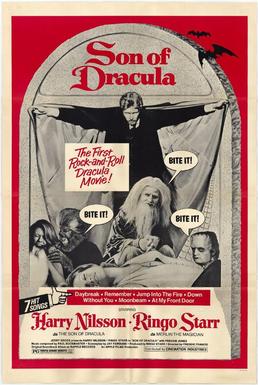
Son of Dracula is a 1974 British musical film directed by Freddie Francis and starring Harry Nilsson and Ringo Starr. It was produced by Starr and released in 1974 by Apple Films. It is also the title of a soundtrack released in conjunction with the film.
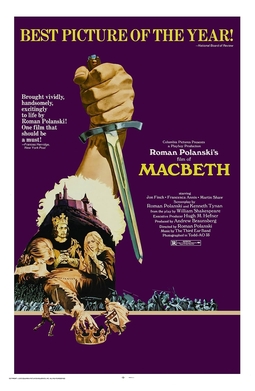
Macbeth is a 1971 historical drama film directed by Roman Polanski, and co-written by Polanski and Kenneth Tynan. A film adaptation of William Shakespeare's tragedy of the same name, it tells the story of the Highland lord who becomes King of Scotland through treachery and murder. Jon Finch and Francesca Annis star as the title character and his wife, noted for their relative youth as actors. Themes of historic recurrence, greater pessimism and internal ugliness in physically beautiful characters are added to Shakespeare's story of moral decline, which is presented in a more realistic style.

Madman Across the Water is the fourth studio album by English musician Elton John, released on 5 November 1971 by DJM and Uni Records. The album was his third album to be released in 1971, at which point John had been rising to prominence as a popular music artist. John's first progressive rock album, Madman Across the Water contains nine tracks, each composed and performed by John and with lyrics written by songwriting partner Bernie Taupin. Yes keyboardist Rick Wakeman plays Hammond organ on two songs.

"Into the West" is a song performed by Annie Lennox, and the end-credit song of the 2003 film The Lord of the Rings: The Return of the King. It was written by Lennox, Return of the King producer and co-writer Fran Walsh, and composed and co-written by the film's composer Howard Shore. The song plays in full during the closing credits of Return of the King, although instrumental music from the song plays at other points during the film itself. “Into the West" was acclaimed by music critics and won Academy Award for Best Original Song, the Golden Globe Award for Best Original Song, and the Grammy Award for Best Song Written for Visual Media.

"Tiny Dancer" is a song written by English musician and composer Elton John and lyricist Bernie Taupin, and performed by John. It was originally released on John's 1971 album Madman Across the Water, and was later produced and released as a single in 1972.
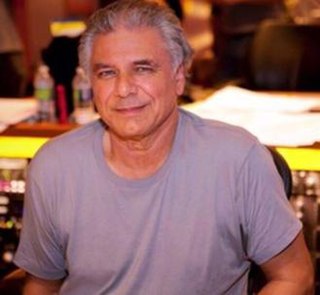
Paul John Buckmaster was a British cellist, arranger, conductor and composer, with a career spanning five decades.
Third Ear Band were a British musical group formed in London during the mid-1960s. Their line-up initially consisted of violin, cello, oboe and percussion. Most of their performances were instrumental and partly improvised. Their records for the Harvest label, Alchemy and Third Ear Band, achieved some popularity, after which they found some success creating soundtrack music for films.
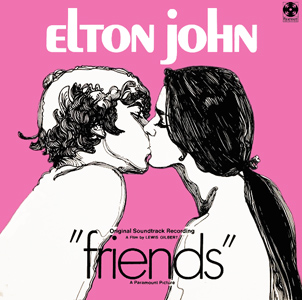
Friends, released in 1971, is the fourth official album release by Elton John. It was a project John and Bernie Taupin took on before their breakout success in the US, and served as the soundtrack album for the Friends film released in the same year. It was certified Gold in April 1971 by the RIAA. It became John's third gold record in as many months in that market. The title track was a minor hit in the US despite the film's mediocre performance. The album also received a 1972 Grammy nomination for Best Original Score Written for a Motion Picture.
Rebellion is a German heavy metal band. It was formed in 2001 when guitarist Uwe Lulis left Grave Digger in 2000, taking ex-Grave Digger bassist Tomi Göttlich with him.
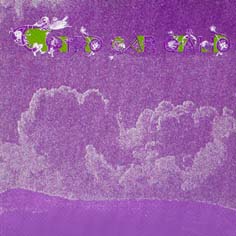
Third Ear Band was the second album by the Third Ear Band, released in 1970. It consists of four improvised pieces, "Air", "Earth", "Fire", and "Water", and is therefore sometimes known as "Elements".

Joy of a Toy is the debut solo album of Kevin Ayers, a founding member of Soft Machine. He is accompanied on the LP by pianist and arranger David Bedford as well as his erstwhile Soft Machine colleagues Robert Wyatt and Mike Ratledge, and his eventual replacement Hugh Hopper, who had previously worked with him in the semi-pro band Wilde Flowers. Among the session musicians are cellist and arranger Paul Buckmaster, jazz bassist Jeff Clyne, oboist Paul Minns and drummer Rob Tait.

The Three Witches, also known as the Weird Sisters, Weyward Sisters or Wayward Sisters, are characters in William Shakespeare's play Macbeth. The witches eventually lead Macbeth to his demise, and they hold a striking resemblance to the three Fates of classical mythology. Their origin lies in Holinshed's Chronicles (1587), a history of England, Scotland and Ireland. Other possible sources, apart from Shakespeare, include British folklore, contemporary treatises on witchcraft as King James VI of Scotland's Daemonologie, the Witch of Endor from the Bible, the Norns of Norse mythology, and ancient classical myths of the Fates: the Greek Moirai and the Roman Parcae.

Michael Bradford is an American musician. A native of Detroit, Michigan he is known mainly as a bass guitarist but also plays guitar and keyboards, and has done extensive work in music production and engineering. Among others, Bradford has worked with Madonna, Youngstown, Kid Rock, Uncle Kracker and in music for films. He is currently the guitarist for The Felons Club and can be heard on their debut album Welcome to the Club.
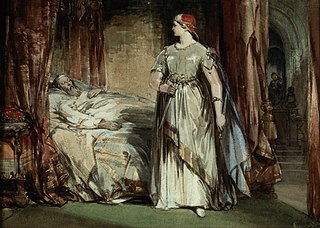
King Duncan is a fictional character in Shakespeare's Macbeth. He is the father of two youthful sons, and the victim of a well-plotted regicide in a power grab by his trusted captain Macbeth. The origin of the character lies in a narrative of the historical Donnchad mac Crinain, King of Scots, in Raphael Holinshed's 1587 The Chronicles of England, Scotland, and Ireland, a history of Britain familiar to Shakespeare and his contemporaries. Unlike Holinshed's incompetent King Duncan, Shakespeare's King Duncan is crafted as a sensitive, insightful, and generous father-figure whose murder grieves Scotland and is accounted the cause of turmoil in the natural world.

Alchemy is an album released in 1969 by the Third Ear Band.

Macbeth is a 2015 epic historical drama film directed by Justin Kurzel and written for the screen by Todd Louiso, Jacob Koskoff, and Michael Lesslie, based on William Shakespeare's eponymous play. The film stars Michael Fassbender in the title role and Marion Cotillard as Lady Macbeth, with Paddy Considine, Sean Harris, Jack Reynor, Elizabeth Debicki and David Thewlis in supporting roles. The story follows a Scottish lord's rise to power after receiving a prophecy from a trio of witches that one day he will become King of Scotland. Like the play it was adapted from, the film dramatises the damaging physical and psychological effects of political ambition on those who seek power for its own sake.
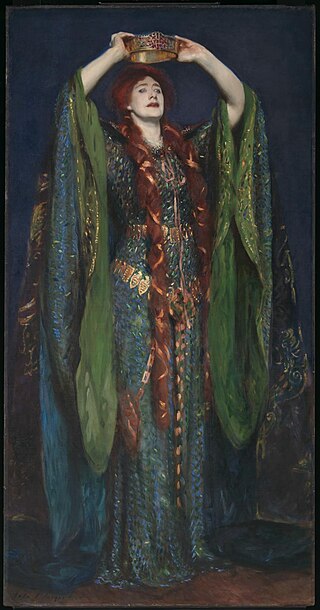
The tragic play Macbeth by William Shakespeare has appeared and been reinterpreted in many forms of art and culture since it was written in the early 17th century.
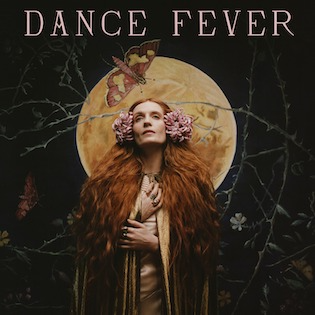
Dance Fever is the fifth studio album by English indie rock band Florence and the Machine, released on 13 May 2022 by Polydor Records. Work on the album was originally scheduled for early 2020 in New York City; however, due to the COVID-19 pandemic, recording took place in London instead. Frontwoman Florence Welch has cited Iggy Pop as the biggest musical influence on the album; which features a variety of styles, ranging from progressive pop to indie pop, disco, and industrial music.


















